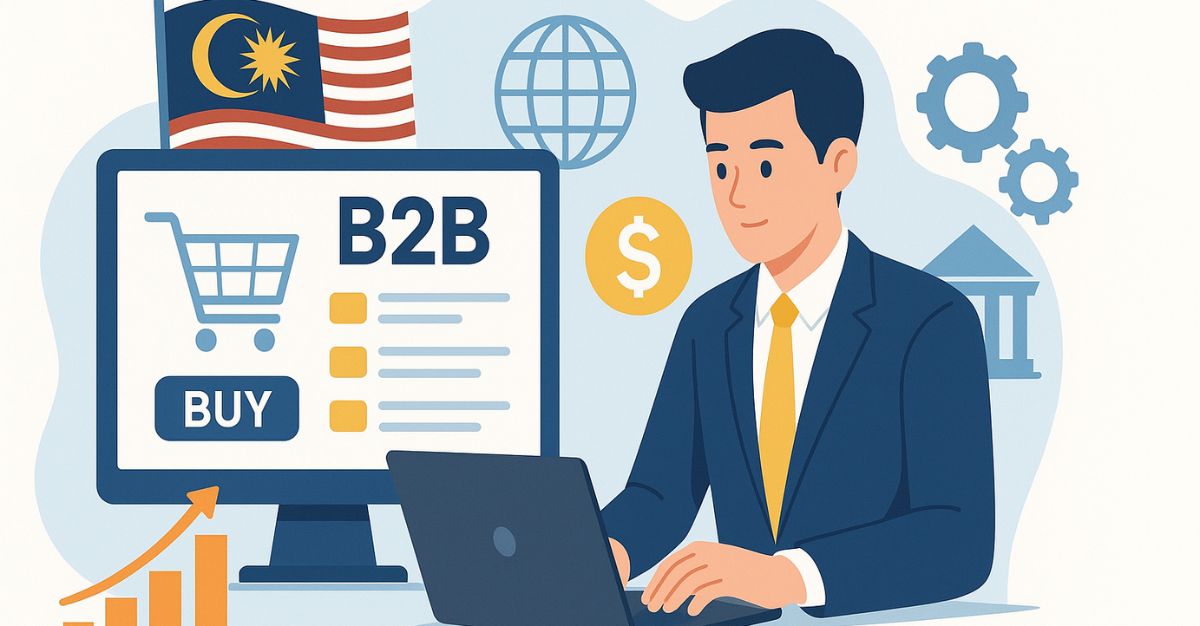Business buyers now expect the same digital ease they enjoy in consumer shopping.
A growing number of B2B companies are moving towards dedicated B2B e-commerce portals because they simplify complex sales processes, improve user experience, and open new digital revenue streams.
A modern B2B ecommerce platform can handle bulk ordering, custom pricing, and account management all in one place.
Let’s explore why building a portal matters, the challenges of traditional sales, and the key features that help businesses grow.
Table of Contents
Why There’s a Need for Building B2B E-Commerce Portals
The business landscape has fundamentally shifted. Procurement teams no longer tolerate the delays and friction of traditional sales methods. They expect digital speed, transparency, and the same seamless experience they get from B2C platforms.
Many B2B companies still handle sales through phone calls, faxes, scattered emails, and manual invoicing. While this worked in the past, today it creates competitive disadvantages.
When buyers face friction in B2B commerce, they don’t wait patiently, they find digital-first competitors who can offer dynamic pricing, bulk ordering, and a smoother user experience.
The gap between buyer expectations and traditional B2B sales methods is widening rapidly. Companies that fail to bridge this gap risk losing market share to more agile competitors.
5 Critical Reasons for Building B2B E-Commerce Portals
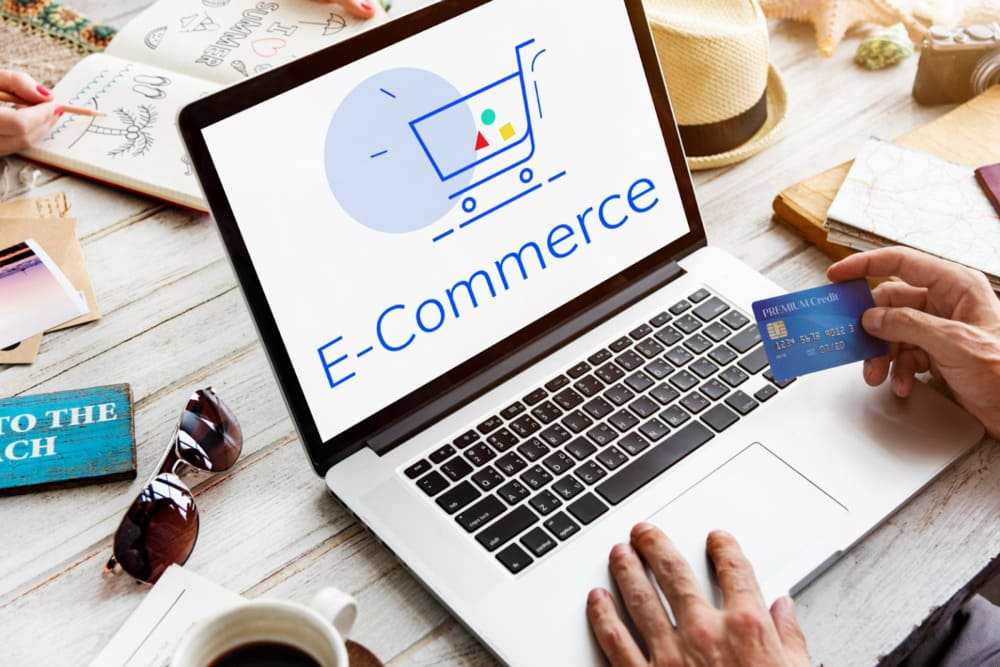
B2B companies that fail to address these five operational bottlenecks risk losing customers to more digitally-savvy competitors who can deliver faster, more efficient buying experiences.
1. Eliminate Quote & Approval Bottlenecks
Traditional requests for quote cycles often drag on for days or weeks. A buyer sends an enquiry, waits days for a reply, then has to renegotiate because the quote lacked customer-specific pricing. Every extra step increases the chance of losing interest or the buyer moving to another vendor.
Solution: Modern B2B platforms provide instant quote generation, automated approval workflows, and real-time pricing updates that cut decision times from days to minutes.
2. Fix Inventory Errors & Pricing Mistakes
Manual entry leaves room for costly miscommunication. A product listed as “in stock” might actually be out of stock.
Or an invoice may show the wrong contract pricing because someone keyed in the wrong discount. Such mistakes hurt trust and can damage long-term account management.
Solution: Real-time inventory management and automated pricing engines eliminate human error and ensure accurate, up-to-date information for every transaction.
3. Gain Data Visibility & Sales Analytics
Without digital tracking, businesses can’t see user behaviour, purchase order patterns, or sales analytics. Sales teams are left guessing which products drive demand or which customers are most likely to reorder. It’s nearly impossible to refine strategy or run ROI tracking effectively.
Solution: B2B platforms provide comprehensive analytics on buyer behavior, product performance, and sales trends, enabling data-driven decision making.
4. Enable Scalable Growth
As markets expand and new buyers enter, traditional systems buckle under pressure. Manual quote management, basic spreadsheets for inventory management, and outdated ERP systems cannot keep up.
What works with 20 customers fails when 200 or 2,000 buyers need fast turnaround and consistent service.
Solution: Cloud-based B2B platforms scale automatically, handling increasing order volumes without additional manual overhead.
5. Meet Modern Buyer Expectations
Buyers are used to seamless B2C ecommerce platforms where they can check real-time inventory, place bulk purchasing orders, and receive instant confirmation. The B2B buying experience has become a competitive differentiator.
Solution: Feature-rich B2B portals that match or exceed B2C user experience standards while adding B2B-specific functionality like custom catalogs and tiered pricing.
Is There Really a Need for Building B2B E-Commerce Portals?
Market data shows that B2B buyers complete an average of 57% of their purchase journey digitally before ever contacting a supplier. Without a digital presence that matches their expectations, you’re invisible during the most critical phase of their decision-making process.
Consider these market realities:
- Speed Expectations: 82% of B2B buyers expect the same level of speed, ease, and personalisation they receive as consumers
- Self-Service Preference: 75% of B2B buyers prefer a rep-free sales experience
- Mobile Research: 80% of B2B buyers use mobile devices during their purchasing journey
- Digital Journey: B2B buyers are 57% – 70% through their buying research before contacting sales
Companies without B2B portals are essentially asking their customers to work harder and wait longer for a worse experience. In today’s competitive landscape, this approach is unsustainable.
Smarter Ordering with a Future-Ready B2B Ecommerce Platform
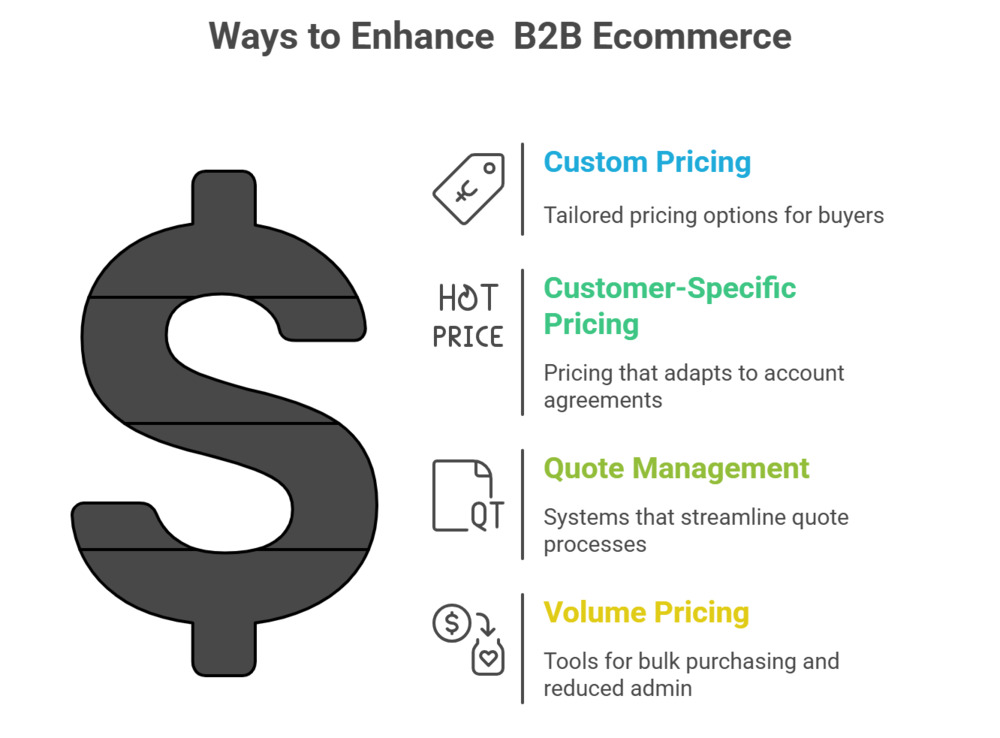
One of the strongest benefits of a B2B ecommerce platform is the ability to support bulk ordering and customer-specific catalogs. Buyers want tailored experiences that match their purchasing decisions.
Features that stand out:
- Custom pricing options such as tiered pricing, contract pricing, and negotiated pricing.
- Customer-specific pricing that adapts to account agreements.
- Quote management and request for quote systems that cut approval times.
- Volume pricing and bulk purchasing tools that reduce repeat admin for procurement teams.
If you’d like to see how these features translate into growth, explore our guide on e-commerce website features.
Integrated B2B Platform with ERP & CRM Systems
A successful B2B platform does not operate in isolation. Modern B2B commerce platforms thrive on third-party integrations and workflow automation. Buyers expect secure payment processing, quick logistics, and real-time inventory updates.
Key integrations include:
- ERP integration for inventory management and purchase order tracking.
- CRM integration for seamless customer relationship management.
- Payment processing systems with PCI compliance and data encryption.
- Marketing automation and customer service automation for follow-ups.
When these systems connect, both buyers and sellers gain confidence. Delays reduce, and account management becomes smoother.
Launch your B2B platform with confidence. Learn how our corporate website can help you succeed, and get started on your project today.
Personalised B2B E-Commerce Experiences that Drive Retention
Digital sales do not stop at checkout. The best B2B ecommerce platforms focus on personalisation and features that encourage long-term engagement.
Effective strategies:
- Personalised dashboards with custom catalogs and customer-specific pricing.
- Case studies and customer testimonials as trust signals.
- Chatbot automation and AI chatbots to support enterprise ecommerce buyers.
- Product information management systems that keep data accurate and current.
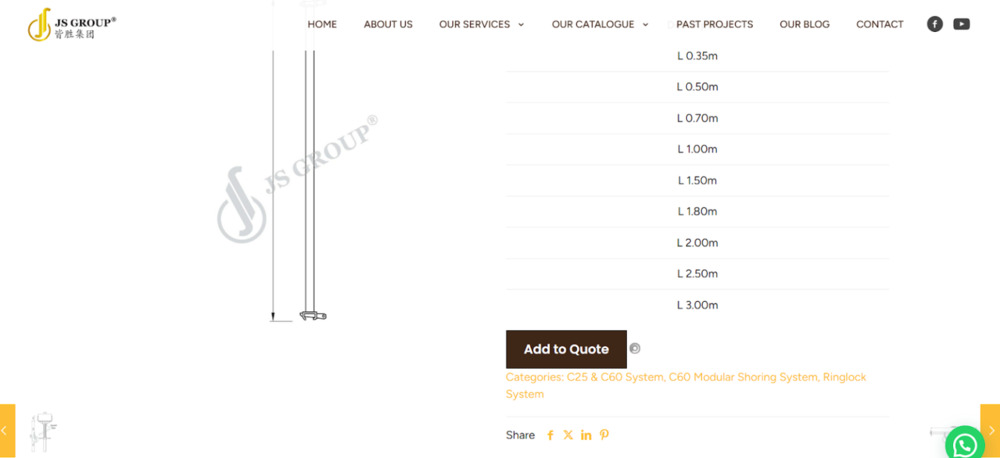
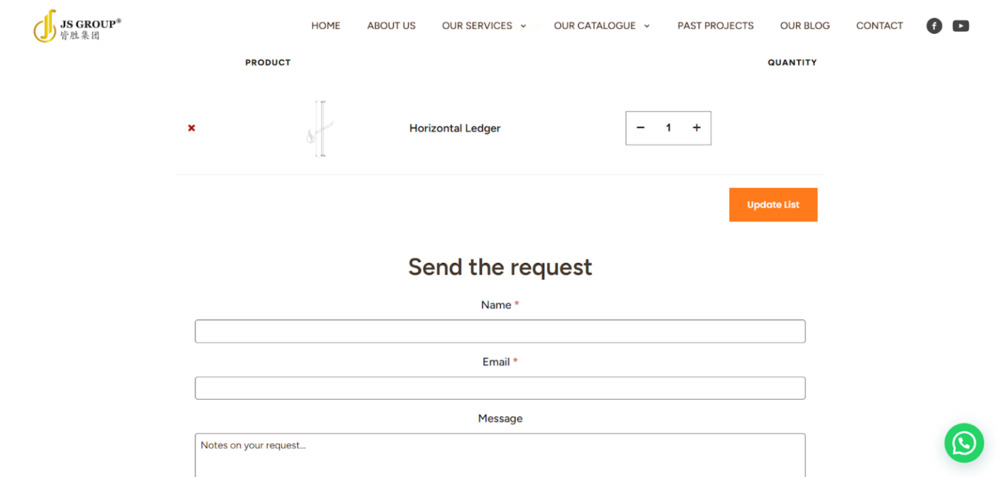
The JS Group platform reflects this by offering a clean user interface that decision makers value.
JS Group has created a quotation function that enhances and accelerates the process of handling client requests. This system enables businesses to generate, share, and track quotations digitally, eliminating the need for manual emails and spreadsheets.
Key features include quick input of client requirements, auto-generated quotes that calculate relevant costs, instant sharing via PDF and email, and a tracking system that allows clients to view and approve or request changes easily.
The benefits for clients are significant: faster response times lead to quicker decision-making, automated calculations ensure transparency and accuracy, and digital convenience allows for easy review and approval.
The system also projects a professional image and improves communication by allowing direct feedback. Overall, the quotation function saves time, enhances trust, and streamlines the buying journey, facilitating a smoother transition from inquiry to purchase.
To maximise visibility for such platforms, explore our Ecommerce SEO service alongside our article on e-commerce SEO checklist.
Mobile Optimisation & Speed for B2B Ecommerce Platforms
Mobile traffic is now a major part of B2B research. If your B2B ecommerce platform fails on mobile optimisation, prospects will abandon the process.
Core web vitals, responsive design, and white space optimisation all affect click-through rates (CTR) and conversion rates.
Steps to improve performance:
- Responsive design with mobile optimisation built in.
- Real-time inventory visibility to avoid disappointment.
- Scroll-triggered animations and micro-animations for stronger engagement rates.
- A/B testing to refine call-to-action buttons and navigation systems.
Slow portals increase bounce rates and reduce session duration. Speed and accessibility-focused design directly impact performance metrics.
For B2B companies serious about growth, our ECommerce website solutions prioritise speed and mobile optimisation as growth drivers.
Omnichannel B2B Commerce: Reaching Buyers Everywhere
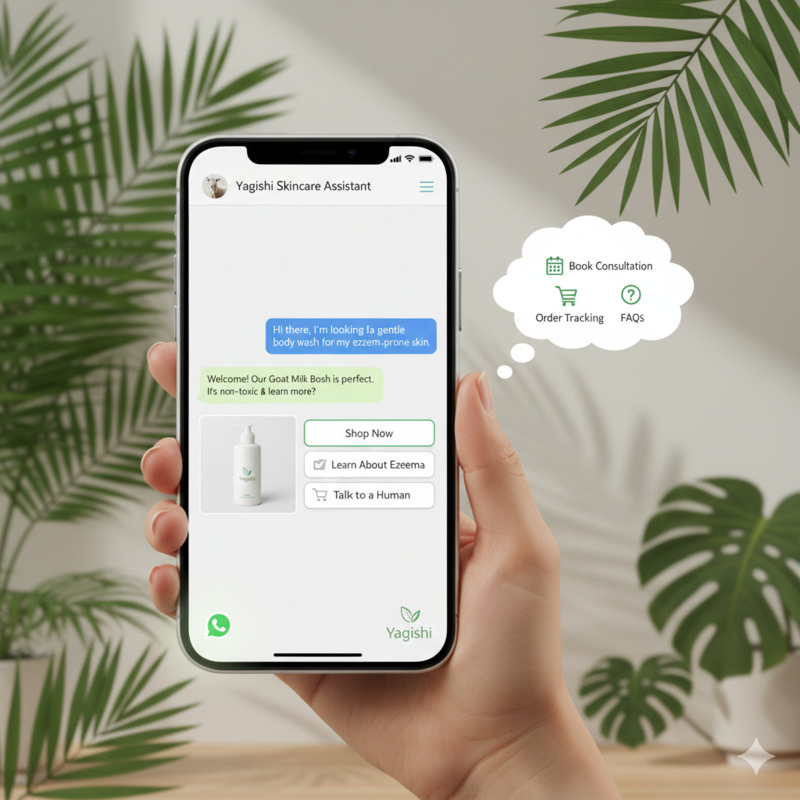
Modern B2B ecommerce platforms no longer live in isolation. Buyers discover products through various channels, such as WhatsApp, Shopee, Lazada, and even TikTok Shop, yet they still expect a central B2B platform that consolidates everything for a seamless purchasing experience.
Your website remains the anchor for conversions, while external channels drive awareness and initial prospect engagement.
Key elements shaping omnichannel growth:
a. Multi-Channel Selling
Products listed on marketplaces like Shopee, Lazada, or TikTok Shop extend reach, but the B2B ecommerce portal should handle account management, custom pricing, and bulk ordering. This way, interest from social platforms still funnels into the website for final conversions.
b. Artificial Intelligence & Machine Learning
Smart recommendations and personalised pricing models use artificial intelligence to guide enterprise buyers. Machine learning tools help refine product information management, real-time inventory, and quote management accuracy.
c. Headless Commerce & SaaS Platforms
A SaaS platform with headless commerce gives flexibility to sell across multiple devices and voice user interface systems. This future-ready approach ensures consistent user experience while supporting omnichannel commerce.
d. Trust & Sustainability
Buyers of enterprise ecommerce solutions now pay attention to sustainability messaging and trust signals. Features like PCI compliance, data encryption, and visible social proof integration, such as client logos or customer testimonials ; reassure decision makers that they are working with a reliable partner.
e. WhatsApp Integration
Many B2B buyers still prefer to chat directly before confirming an order. Adding a WhatsApp number for enquiries alongside your portal’s call-to-action buttons improves accessibility and increases lead qualification rates.
By combining these elements, B2B companies create a flexible platform that captures leads across multiple entry points but keeps the website as the ultimate hub for secure payment processing, contract pricing, and workflow automation.
The Time to Act is Now
A modern B2B ecommerce platform goes far beyond an online catalogue.
It becomes the hub of your sales cycle, connecting buyers with custom catalogs, customer-specific pricing, and secure B2B payment methods. With advanced security features, flexible platform design, and workflow automation, it reduces friction and supports sustainable growth.
If your business is ready to embrace B2B e-commerce, we can help. Explore our content marketing, or Google Ads services to strengthen your platform with targeted visibility.
Ready to accelerate your digital trade? Contact Newnormz today.
Let’s build a future-ready B2B ecommerce platform for your company.
